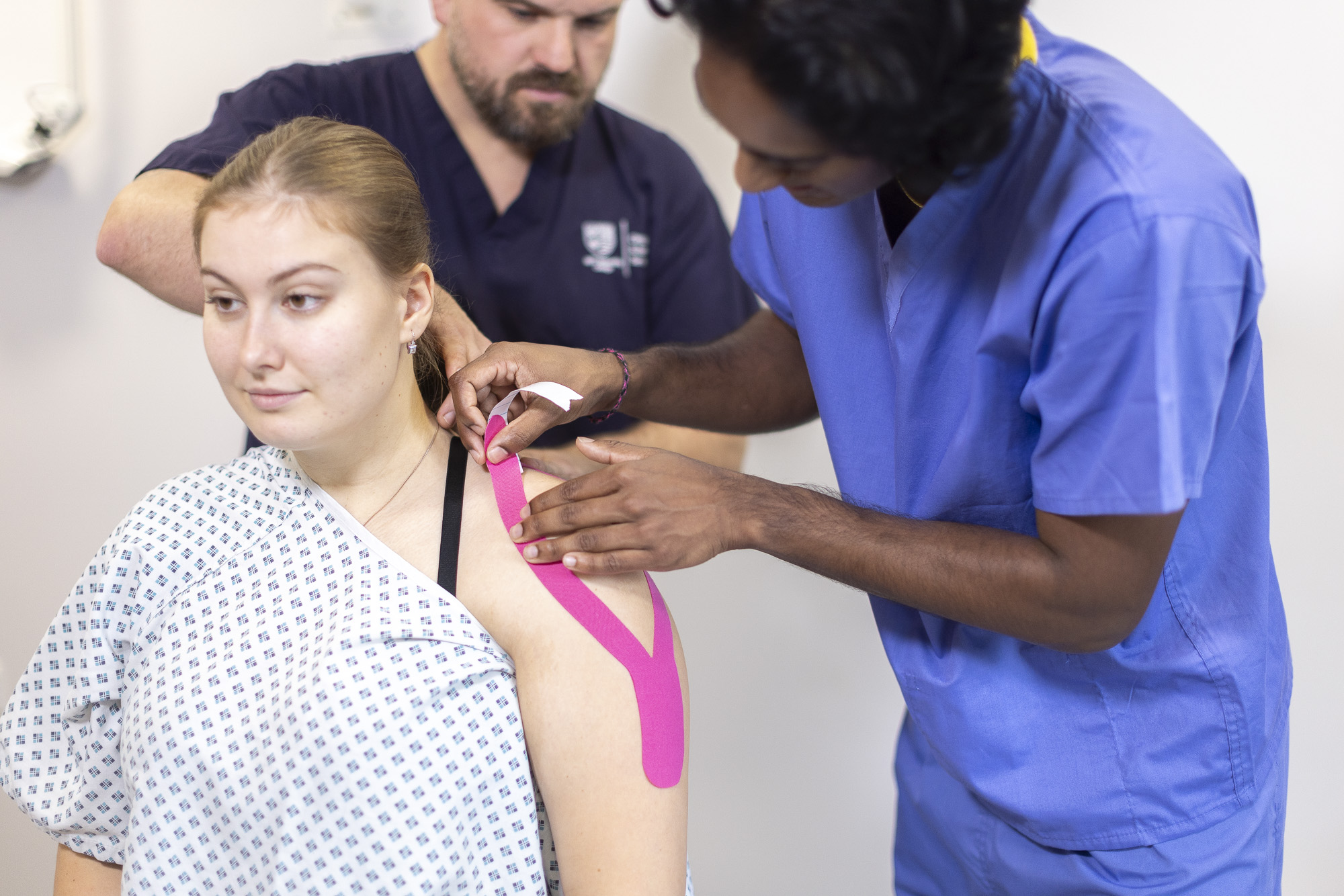Overview
Healthcare educators play a vital role in our universities, workplaces and public services. Develop your competence and learn how to teach more confidently and effectively with this flexible course, built around the needs of your role. You’ll study the latest research and evidence-based teaching, learning and assessment strategies, applied across a range of different settings, taught by highly-skilled educators from both academic and practice settings.
All students complete the core unit of the course, aimed at developing both your practical teaching skills and your understanding of educational theories. You’ll be encouraged to think critically and to analyse your practice. Then you’ll choose two further units from a range of options. You could focus on the design and development of educational interventions; or explore simulation-based education as a tool for teaching and assessment. You could choose to develop your competence and capabilities as a workplace supervisor; build your expertise in delivering technology and digitally-enhanced learning; or explore key leadership issues within education today.
Course Details
How this course is structured
There is one core unit (Principles of Learning, Teaching and Assessment) and two optional units which make up the 60 credits required for this course. You will need to select these two optional units at application stage from a portfolio of five units. Details of the units are provided below:
Additional Information
The PGCert Health Sciences Education is designed for appropriately qualified and experienced practitioners/educators who support the process of learning, teaching and assessment in the practice and academic setting related to health sciences and healthcare. The course has been designed to be flexible to meet the needs of the workforce by offering one core unit and then a selection of optional units, which allow the course to be shaped by your own development requirement.
Through the course you will build confidence and gain competence as an effective educator by engaging with research and evidence-based teaching, learning and assessment strategies across a range of different, complex settings. You will learn from highly skilled educators from both academic and practice settings through various activities and through sharing experiences with your peers.
How to apply?
Applications are now open. To register your interest now or ask any questions about the course, please complete the form at the bottom of the page.
Unit Breakdown
Principles of Learning (Core) 
Units
Principles of Learning, Teaching and Assessment
Core Unit
This unit aims to equip you with appropriate professional attributes, knowledge, understanding and skills required to become or further develop as an effective, reflective educator in a professional educator role across a range of areas such as workforce/service education and higher education.
In so doing, this should support the development and delivery of high quality, educational interventions. The unit aims to facilitate development of your education practice and understanding of theoretical perspectives on teaching, learning and assessment. You are encouraged to make critical and innovative connections between policy, educational theory and your own practice.
You will be supported in analysing your own practice as an educator, evaluating a range of educational strategies in your own professional context and applying these ideas to the development of your developing education practice.
Designing Education 
Units
Designing and Developing Health and Social Care Education Interventions
Optional Unit
This unit aims to equip you with knowledge, understanding and skills required to enable you to be able to lead on or be involved in designing and developing an educational intervention for health and/or social care practitioners or service users/patients or other interested parties.
This includes facilitating learning around philosophical underpinning and research related to good practice for effective curriculum / educational intervention design and development. The aim is to support in designing and developing a relevant educational intervention / curriculum based on an appropriately selected topic that is targeted towards a specific learner group.
You will have the opportunity to share this with peers and tutors by presenting at a simulated internal ‘validation’/ approval’ event. The unit aims to explore complexities of building educational interventions from planning to delivery and evaluation that will offer effective learning and teaching with a focus on health and/or social care education.
Simulation-based Education 
Units
Simulation-based Education for Health Science Practice
Optional Unit
Simulation is becoming more widely established as a tool for a range of health and social care professions for teaching and learning, creating simulated scenarios that mirror the reality of practice.
Use of simulation-based education provides opportunities to enable best practice development and to use situations that resemble reality, within a safe environment, to test out the knowledge and skills of students, assessing competence appropriately, safely and effectively.
The unit aims to offer you a platform for exploring and understanding the theoretical elements for applying simulation for learning, teaching and assessment of hands-on practical and technical skills, whilst promoting its use for non-technical skills, such as those focused on communication, human factors and other aspects that are core to health and social care practice, across all relevant professions.
Workplace Supervision 
Units
Workplace Supervision: Supporting Health and Social Care Professionals
Optional Unit
This flexible unit aims to support and facilitate building and/or further developing your competence and capability as a workplace supervisor or guiding others to develop as such, within the context of relevant practice or educational settings.
The unit offers a flexible approach for embedding your learning and professional development within your practice, with particular focus on formative, normative and restorative functions of being a supervisor and developing as an effective and supportive mentor.
You will have the opportunity to share your experiences with student peers working in practice and academic institution settings, exploring best practice and areas for improvement together in a safe, facilitated setting.
Technology Enhanced Learning 
Units
Technology and Digitally Enhanced Learning
Optional Unit
The aim of the unit is to provide you with an understanding of appropriate theory, technologies and tools to enable you to plan, design & develop student-centred digital resources and activities that support student learning online, face-to-face and in blended learning environments. The emphasis is on linking theory and practice through engagement with learning types and styles and an appraisal of a range of teaching tools and technologies currently available. You will have the opportunity to evaluate a technology enhanced learning activity/digital learning resource relevant to your clinical practice or academic education environment and relevant to your own practice.
Leading for Education 
Units
Leading for Education (to be validated in 2023)
Optional Unit
This unit is designed for people currently working in or aspiring to work in a leadership position in their educational role. The unit will develop your understanding of key leadership issues in education and help to develop your practical approaches to improvement and effectiveness.
The unit enables students to critically engage with research on educational leadership and the management of change and improvement, with a view to applying their theoretical understanding to their practice. You will also critically reflect on your own position and opportunities as a leader within your educational workplace
Entry Requirements
What qualifications do I need? 
What qualifications do I need?
You will need a first degree in a relevant subject or equivalent, with a minimum of 3 years’ experience in your clinical field. You must be employed in the role that involves the design and delivery of education and training.
Evidence of prior learning 
Evidence of prior learning
If you have prior academically accredited units that are relevant to the course learning outcomes, you can apply for the Recognition of Prior Learning (RPL). The RPL process allows for completion of credits in a staged process by acknowledging previously completed units. Units being considered for RPL will be reviewed to ensure they meet the learning needs of the course and specific unit.
Is there anything else that’s required? 
Is there anything else that’s required?
If you’re not sure about anything listed here, please contact our Admissions team or call us on 01202 436200 and we’ll be happy to answer any questions you have.
For more information about our admissions policies and procedures, including our Admissions Complaints and Appeals Policy, see latest policies.
Still have questions about applying?
Course Fees
Our current course costs for the PGCert Health Sciences Education part-time course are per unit and are shown below.
UK/ROI/ Channel Islands
The fees per unit are either:
- £830 per 20 credit unit or £2490 for the 60 credit award
Please note: These fees are for the 2024-25 academic year only and may be subject to increase in subsequent years of study. Any increase will be in line with our Tuition Fees Policy but will not be more than 5%.
Funding Support
If you currently work with the NHS, you may be eligible for funding from your employing organisation.
Additional Course Costs
Your tuition fees will cover the cost of all mandatory elements of the course, however you may be expected to have an electronic device to access course materials. Additionally, you may be expected to purchase copies of any required textbooks, and may wish to purchase your own copies of recommended textbooks.
For more information see Additional Costs page.
Visit our student finance pages for more information on Fees and Funding.
Register your Interest
Register your Interest / Enquiry 

Why choose AECC University College
There are many benefits to studying at AECC University College, from our expertise and history in teaching health sciences, to our state-of-the-art facilities, on-site clinical training, and of course our location on the beautiful Bournemouth coast.







